Watching royal events, from 1953 to the Twitter age
- Published
Archive: Commentator Mary Hill describes the scene as the crowds watch the Queen arrive for the Coronation
The Queen's accession to the throne was followed by an event which dominates the history of mass television - the BBC's coverage of her Coronation in June 1953.
Twenty million Britons watched live - in a country with just over two million TVs.
Today there are 25 million TV licences in the UK, each standing for a household with multiple points of access to TV and the internet.
Millions chat constantly by text and Facebook; comments on anything that happens are shared at once on Twitter. We can follow news on our phones and choose our own times for viewing.
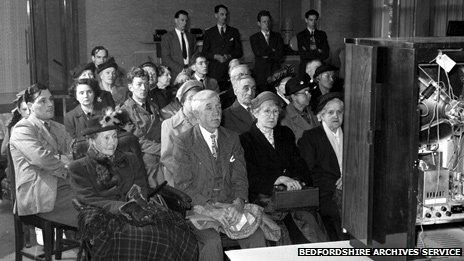
Watching the Coronation in Bedford. Twenty million Britons watched on just over two million TV receivers
But where observing state occasions is concerned, how much has changed, really? I asked people who remembered watching in 1953, and young people active in the <link> <caption>Media Trust,</caption> <url href="http://www.mediatrust.org/" platform="highweb"/> </link> which campaigns to spread media knowledge and participation.
KEN KINGHAM
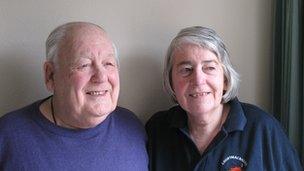
Ken and Mollie Kingham. By watching the Coronation live on TV "you were actually sharing in some way", says Mollie
"I didn't have a telly so I got one for the Coronation, says Mr Kingham, who was 27 in 1953 and living in Twickenham.
"It was the first telly we had; it was a Bush in a cabinet with doors and I got it second hand from some friends who were emigrating.
"I don't remember it being particularly scintillating, but it wasn't in those days, although the set we bought was a better set than I'd have been able to buy (new)."
After the television coverage, "we had the usual mandatory street party with the kids and everybody. I won the dads' race and got 100 cigarettes".
MOLLIE KINGHAM
Ken's wife Mollie was 11 at the time of the Coronation. There was no electricity in her Suffolk village, but her uncle had a generator - and a TV.
There were a lot of relations and neighbours in the small cottage room.
She says the TV coverage "was something beyond the experience of ordinary people; by watching "you were actually sharing it in some way."
This year, she says, people will watch together but not in such big groups - "and yes, the youngsters will be texting and Facebooking and all those things".
SABIAN MUHAMMAD
At 22, Sabian Muhammad is a media entrepreneur and young ambassador for the Media Trust. Facebook and Twitter will be crucial in influencing how much of this year's state events young people will watch, he believes.
Last year, he says, "I wasn't interested in the royal wedding and I resisted, resisted, resisted - until my timeline was blitzed with everyone talking about the royal wedding and I thought: 'Oh, I'd better see that.'
"It wasn't just people talking about the wedding; it was people saying funny things... 'Oh, what's Harry doing? Why's he standing like this?'
"Being able to see it and being able to tweet about it and share loads of experiences with our friends while we're doing it makes it so much more enjoyable."
HAZEL LYELL
"My parents rented a television - it was one of those little nine-inch Bush sets where there was more Bakelite casing than screen," says Mrs Lyell, who was 12 and living in Heston, Middlesex, in 1953.
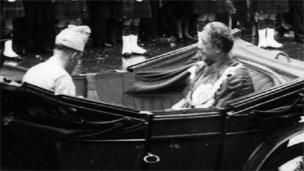
Queen Salote of Tonga won viewers' hearts when she kept her carriage open despite the rain
After the hardships of the war and with rationing still going on, the Coronation "was different... a real excuse to celebrate; the first real celebration that everyone could take part in".
The Queen, she remembers, "looked so alone - such a small figure surrounded by all these dignitaries".
She says she will watch the Jubilee events, but "because there's much more going on, it doesn't have the same importance that the Coronation did, because there was nothing else".
ZANETA DENNY
Zaneta Denny, 25, a reporter for London360 on the Media Trust's Community Channel, likes watching major public events but does not think the Jubilee will be a big family occasion:
"I think personally my family are not going to get together to watch it; we'll watch it individually... Most of my family have 24-hour news channels, so we'll look at it... we'll watch it because we feel we want to be engaged in what's happening in the news."
LAWRENCE MASON
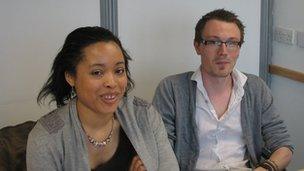
Zaneta Denny and Lawrence Mason are community reporters for the Media Trust
"With the royal wedding, all my housemates were up for it," says Lawrence Mason, 23, a Media Trust community reporter. "No-one was really that interested in it per se, but still wanted to be part of it and sat down to watch it on the BBC.
"And it was a little bit dry, a little bit kind of archaic... and I didn't really feel engaged and about halfway through I said: 'I can't watch this.'"
But there is still a compulsion to watch a big event live, he thinks: "You have to be watching it when it happens, otherwise you've missed it and your opinion's not as exclusive as everyone else's."
FLAMINIA GIAMBALVO
Flaminia Giambalvo, 23, believes younger viewers want to participate in major events, not just sit and watch - and if something takes their interest, they will want to capture and adapt it via social media:
"If they see anything they're going to want to participate in it, via Twitter or physically... either young people are involved, can take part in the events, or we're not really interested.
"One of the factors that gets things on YouTube is the idea of taking something very popular and then making it your own - taking it over; the videos that have been watched millions of times have all been remade."
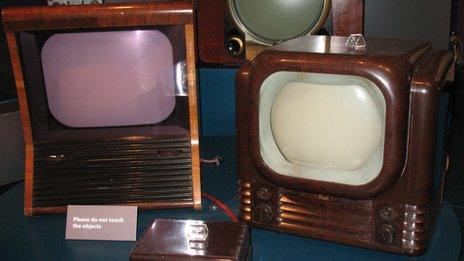
Pye (left) and Bush TV sets as available in 1953, at the National Media Museum. The Bush's nine-inch screen is similar in size to a modern iPad
SYLVIA DYMANT
"I got up at six in the morning because I had to prepare all the food," Sylvia Dymant, 17 in 1953, recalls. "And I can remember I was the one making pots and pots of tea all through the day."
Her parents bought a TV - the only one in their street in Maidstone. "We had a good picture; we could see everything on the screen, but it wasn't a very big screen.
"It was royalty. They could do no wrong... Everybody respected them and thought they were wonderful in the war."
This year, she thinks: "Loads of people will want to go to London to actually join in - because they can watch it on telly in the evening; they've got the choice now."
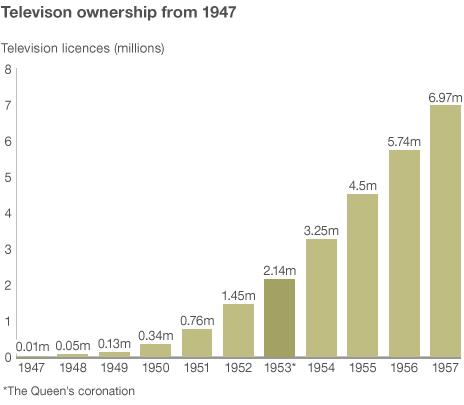
When the Coronation took place there were just over two million TVs in Britain. But the numbers were growing fast and the Coronation did not have any obvious effect on ownership